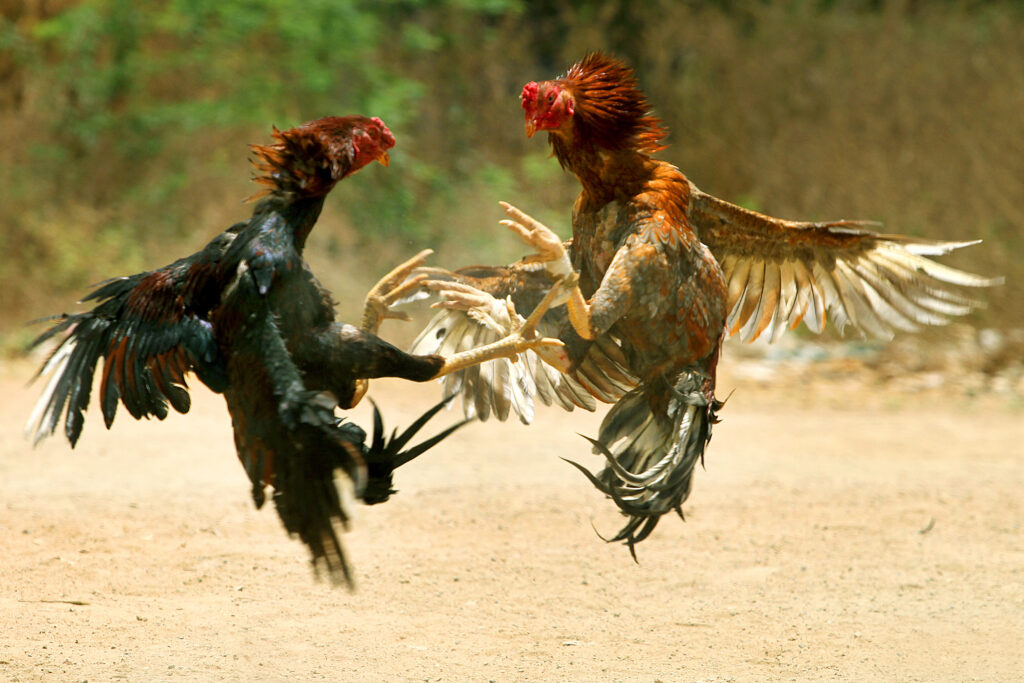When I called up a Guest House the day before our journey to Jhargram, the call of a rooster unimpeded by any noise came on the line before the owner could speak. It instantly cheered me up, for I could sense the surrounding silence out there. Little did I know then that I’d by sheer chance come across a sport that would haunt me for the rest of my life.
Out in a car travelling around this belt where nature is still so picturesque, also historically and culturally an important town that spawned many writers and artists, we heard calls of roosters mixed with murmurs of a crowd from far off. When I asked the driver if any festival was on, he informed us of the cockfight festival and took us to Tiakati village ground.
I found other cars and scooters parked along the side of the road. A big arena in the outstretched field was fenced off with bamboo poles. Around it cocks of different sizes, some of them close to 5 kg, pecked at morsels of food spiked with local liquor, their legs tied to spikes with a cord.
I could see tribal women selling toddy to local Santhal people. It was a day- long affair, and fights between big cocks where more money was at stake and promised to be more ferocious, were slated for the later part of the day when the crowd would swell.
Two persons carrying a cock each sat on their haunches facing each other. These cocks had never met before. First a sense of rivalry had to be created. The men held the birds, brought them close and then took them away. Soon the cocks raised their hoods, started unfurling their wings and made attempts to free themselves to go at each other. Then the men got up, put the birds on the ground and let them fly at each other. Occasionally they picked them up and set them down again.
Suddenly, the razor-sharp blade tied to the foot of one cock slashed the neck of the other. The blood spurted high up and the bird dropped lifeless on the ground, its shiny feathers still convulsing. It took hardly a minute or two for this lethal game to end. At different places inside this ring, quite a few such fights were going on. Roosters kept falling dead and were taken away. It looked like genocide.
A fight took place just a few yards from where I was standing outside the waist-high bamboo fence. A white and a brown rooster were in fray. The brown one suddenly fled the scene and started running towards me when it was caught and made to rejoin the contest.
I left the scene. As I drifted away what Atticus Finch and Miss Maudie, in To Kill A Mockingbird, tell Jem and Scout, when they get air rifles as a Christmas gift, came to my mind: “I’d rather you shot at tin cans in the back yard, but I know you’ll go after birds. Shoot all the blue jays you want, if you can hit them, but remember it’s a sin to kill a mockingbird … Mockingbirds don’t do one thing but make music for us to enjoy. They don’t eat up people’s gardens, don’t nest in corncribs, they don’t do one thing but sing their hearts out for us.”
In remote pockets of Jhargram where vast tracts of scenic land are waiting to be grabbed by the land sharks, where basic amenities of living are still a far cry, this blood-spilling game keeps the uneducated tribal youth boiling with excitement.
It was late December. But the sun was fierce even in the afternoon. We got into the car with troubled minds and returned to the Guest House where I asked a local person:
“Don’t you think this cockfight fest is gory, this spilling of blood and loss of innocent lives?”
“They are going to die anyway,” he said, rather nonchalantly, “it’s just a sport where either you win or you lose. There’s nothing more to it.”
“Where does it usually take place in Jhargram?”
“Tiakati, Kushumdanga, and some other places.”
“Do you take part in it?”
“Oh yes, regularly. We raise roosters at home specifically for this purpose.”
“But where does this knife / blade fixed to their legs come from? And what do you get out of this brutal sport?”
“We pay the man who supplies the blades. Whoever wins takes away the dead one, and the money is paid by the owner who loses the contest.” He did not disclose that betting was involved.
There’s something in me that responds to the silence in the wild. Never again will the cock-a-doodle-do sound the same again, to accentuate such silences. The rooster’s cry now seems like an appeal for freedom from man’s inhumanity.
